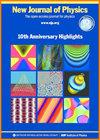广义贝尔情境中贝尔非位置性与局部科亨-斯派克情境性之间的权衡关系
IF 2.8
2区 物理与天体物理
Q2 PHYSICS, MULTIDISCIPLINARY
引用次数: 0
摘要
在过去的几十年里,贝尔非位置性和 Kochen-Specker 背景性之间的关系一直是许多不同视角的研究课题。最近,人们在所谓的广义贝尔情境(即贝尔空间分离(或机构独立)与(至少一方)在每轮实验中进行兼容测量的能力并存的情境)中探索了这些关系的一些有趣结果。当这一方拥有 n 周期兼容设置时,最初有人声称在这一方的本地实验中,贝尔非位置性与情境性无法同时被观测到。然而,通过对局部性定义进行更自然的解读,我们发现贝尔非局部性和局部上下文性实际上是可以同时存在的。尽管如此,我们还是在这项工作中证明,在最简单的情况下,这两种资源不可能任意同时存在。也就是说,在这些情况下,我们证明了对任何贝尔不等式的违反都会限制对任何本地非语境不等式的可能违反。我们还使用非局部性和上下文性的量词探讨了这种权衡关系,讨论了如何从上下文性的 "全局 "概念来理解这种关系,并研究了将这一结果扩展到其他情景的可能性。本文章由计算机程序翻译,如有差异,请以英文原文为准。
Trade-off relations between Bell nonlocality and local Kochen–Specker contextuality in generalized Bell scenarios
The relations between Bell nonlocality and Kochen–Specker contextuality have been subject of research from many different perspectives in the last decades. Recently, some interesting results on these relations have been explored in the so-called generalized Bell scenarios, that is, scenarios where Bell spatial separation (or agency independence) coexist with (at least one of the) parties’ ability to perform compatible measurements at each round of the experiment. When this party has an n -cycle compatiblity setup, it was first claimed that Bell nonlocality could not be concomitantly observed with contextuality at this party’s local experiment. However, by a more natural reading of the definition of locality, it turns out that both Bell nonlocality and local contextuality can, in fact, be jointly present. In spite of it, in this work we prove that in the simplest of those scenarios there cannot be arbitrary amounts of both of these two resources together. That is, in these cases we show that the violation of any Bell inequality limits the possible violations of any local noncontextuality inequality. We also explore this trade-off relation using quantifiers of nonlocality and contextuality, discussing how such a relation can be understood in terms of a ‘global’ notion of contextuality, and we study possible extensions of this result to other scenarios.
求助全文
通过发布文献求助,成功后即可免费获取论文全文。
去求助
来源期刊

New Journal of Physics
物理-物理:综合
CiteScore
6.20
自引率
3.00%
发文量
504
审稿时长
3.1 months
期刊介绍:
New Journal of Physics publishes across the whole of physics, encompassing pure, applied, theoretical and experimental research, as well as interdisciplinary topics where physics forms the central theme. All content is permanently free to read and the journal is funded by an article publication charge.
 求助内容:
求助内容: 应助结果提醒方式:
应助结果提醒方式:


